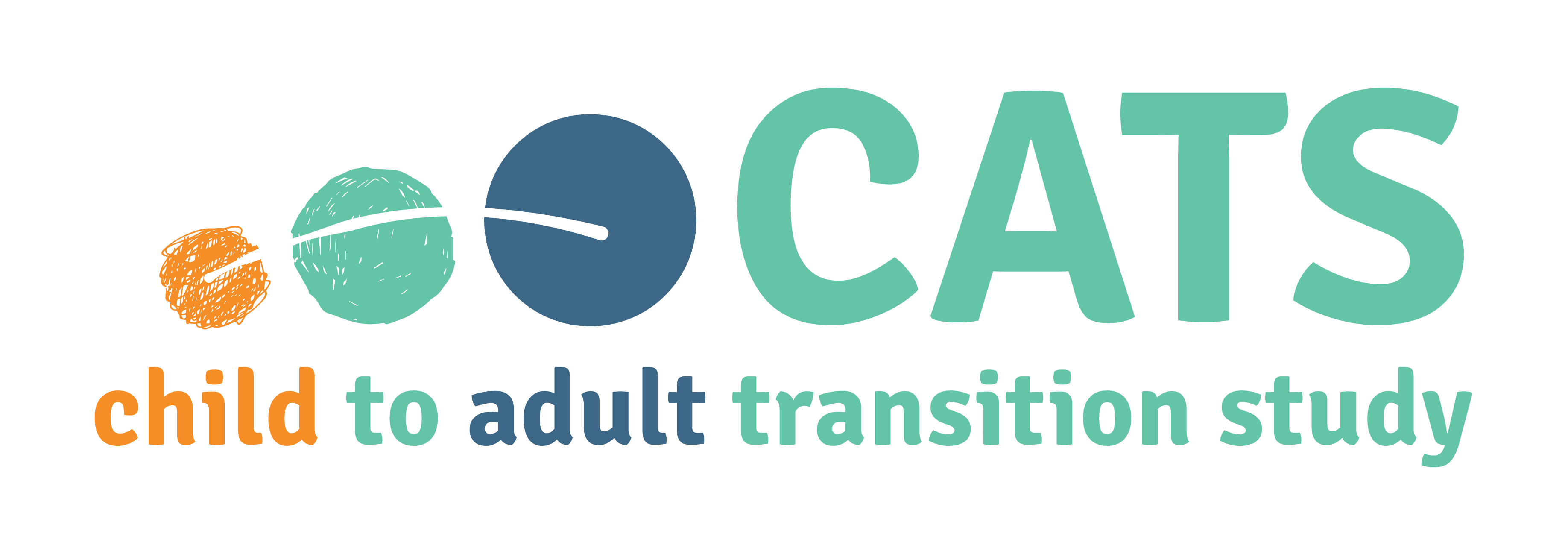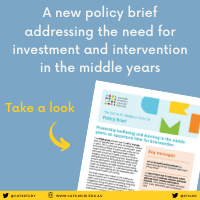Background and aims
 The Child to Adult Transition Study (CATS) is a unique longitudinal study following over 1200 children as they transition through adolescence and into adulthood. The main focus is on health,
emotional development and academic outcomes. CATS is also interested in the
experience of young people as they go through important transitions such as
puberty, the move to secondary school, the 'middle years' (8-14 years), and the
transition into the workforce or higher education. We hope to identify young
people who are most at risk as they pass through these important years,
identify factors that may improve health and academic outcomes during this
time, and learn how the effects of these continue into adulthood.
The Child to Adult Transition Study (CATS) is a unique longitudinal study following over 1200 children as they transition through adolescence and into adulthood. The main focus is on health,
emotional development and academic outcomes. CATS is also interested in the
experience of young people as they go through important transitions such as
puberty, the move to secondary school, the 'middle years' (8-14 years), and the
transition into the workforce or higher education. We hope to identify young
people who are most at risk as they pass through these important years,
identify factors that may improve health and academic outcomes during this
time, and learn how the effects of these continue into adulthood.
The study began in 2012 when the children (study participants) were in Grade 3 (8-9 years old) and attending primary schools in metropolitan Melbourne, the study has caught up with participants every year. We hope to
continue checking in with participants to ask about their health, wellbeing,
interests, life circumstances, and how they are managing the many transitions
occurring as they progress through adolescence and into
young adulthood.
CATS will provide the most comprehensive overview of the association between pubertal development and the major health problems that become prevalent in early adolescence. The information collected as part of this large study will help us identify when
and how to promote the best health and emotional adjustment in pre-teens and beyond.
Key publications
Mundy, L. K., Canterford, L., Dashti, S. G., Husin,
H. M., Beatson, R., Edwards, B., & Patton, G. C. (2023). Adolescents at risk
of mental health problems in the COVID-19 pandemic: A prospective
population-based study of the effects of government mandates and school
closures. Australian Journal of Social Issues, 58,
70-89.
Dashti, S. G., Mundy, L., Goddings, A. L.,
Canterford, L., Viner, R. M., Carlin, J. B., Patton, G. & Moreno-Betancur,
M. (2022). Modelling timing
and tempo of adrenarche in a prospective cohort study. PLoS ONE,
17(12), 1-13.
Mundy, L. K., Canterford, L., Moreno‐Betancur, M.,
Hoq, M., Viner, R. M., Bayer, J. K., Lietz, P., Redmond, G., & Patton, G.
C. (2022). Learning outcomes
in primary school children with emotional problems: a prospective cohort study. Child and
Adolescent Mental Health.
Mundy, L., Simmons, J., Allen, N. B., Viner, R.,
Bayer, J. K., Olds, T. S., Williams, J., Olsson, C., Romaniuk, H., Mensah, F.,
Sawyer, S., Degenhardt, L., Alati, R., Wake, M., Jacka, F. N., & Patton, G.
C. (2013). Study protocol: the
Childhood to Adolescence Transition Study (CATS). BMC Pediatrics,
13, 160. (IF 2.21).
The
full list of publications
can be found on CATS publications site.
Key reports
Mundy L, Raniti M, Husin H, Canterford L, Allan E, O’Connell M, Patton G (2019) Mental health in the middle years of childhood: consequences for later mental disorders and educational attainment. Melbourne: Victorian Department of Education and Training.
Evans-Whipp, T., Mundy, L., Canterford, L., Patton, G. (2018) T
he Effects on Schooling Outcomes of Early Developmental Vulnerabilities in Children, Canberra: Australian Government Department of Education and Training
Evans-Whipp, T., Mundy, L., Canterford, L., Patton, G. (2018)
Student Wellbeing, Engagement and Learning across the Middle Years, Canberra: Australian Government Department of Education and Training
Deery, A., Mundy, L., Hardiman, K., Patton G. (2016) Readiness for Secondary School: The Childhood to Adolescence Transition Study (CATS). Report prepared for the Victorian Department of Education and Training.
The transition to secondary school
The transition from primary school is one of the most important events in the lives of young people. It also occurs around the same time as puberty, which brings a number of physical, biological, and social changes. Yet compared to the transition into primary school, there hasn’t been much research on this stage of life. The transition to secondary school has been a major focus of our work over the past decade. This page brings together a number of resources around the transition that are informed by our research. We encourage you to take a look and get in touch if you'd like to know more about the work we’re doing in this space. Read more.
 Promoting wellbeing and learning in the middle years
Promoting wellbeing and learning in the middle years
The Promoting wellbeing and learning in the middle years: an opportune time for intervention policy brief is based on data collected from CATS. It summarises some of the issues occurring for students aged 8-14 years and why greater investment in this period would be beneficial. It calls for the government to introduce a health promoting framework that aims to strengthen curriculum around social and emotional learning, improve the primary to secondary school transition, and enable more effective links between education and health services. It also provides more specific recommendations for government, schools and educators to help maximise the support provided to students aged 8-14 years.
Collaborators
CATS is a collaborative study between the Commonwealth Department of Education and Training and the Victorian Department of Education and Training.
Funding
Funding for CATS has been provided by the National Health and Medical Research Council (NHMRC); the Invergowrie Foundation; The Royal Children's Hospital (RCH) Foundation; Murdoch Children's Research Institute; Victorian Department of Education and Training (DET); Australian Government Department of Education and Training;
Australian Rotary Health.
Further information and digital media
Further information on CATS can be found on the
CATS website.
You can also follow CATS on Twitter, Facebook and
Instagram.